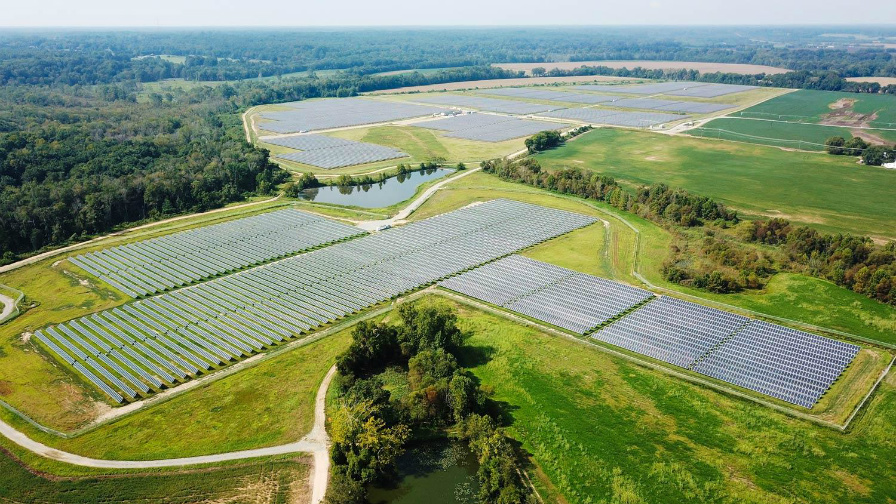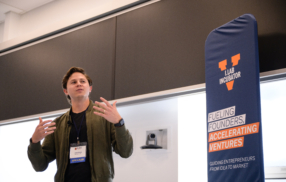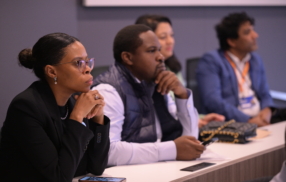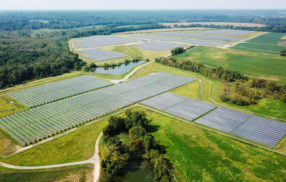
10 Years Greener: UVA Darden Sustainability Plan Delivers Uniquely Darden Success Story
By Dave Hendrick
In late 2018, roughly 65,000 solar energy panels amassed across 160 acres in rural Eastern Virginia came online, producing enough electricity to power a significant portion of the University of Virginia and allowing the University of Virginia Darden School of Business to make good on its goal to reach net zero carbon emissions by 2020.
The successful goal was just the latest check mark in a yearslong effort to establish the School as a sustainability leader, part of a bold vision staked out by then-Dean Bob Bruner in 2008, which aimed for carbon and waste neutrality by 2020 and for Darden to be a top School for thought leadership on sustainability by 2013.
Eventually shorthanded as “How We Live and How We Learn,” the plan called for the development of a sustainability mindset in the School’s approach to everything from the operation of facilities to teaching and research. The plan was made out of a sense that the School needed to ensure graduates could lead with an understanding of sustainability opportunities and how global sustainability trends could spur corporate innovation and entrepreneurial activity.
“By looking, listening, studying and trying, my colleagues and I grew to believe that Darden should engage more energetically with the environment,” Bruner wrote in 2008. “The hearts of business professionals should be in this. Businesses and business schools need to find the intersection between economic growth and environmental sustainability.”
According to Erika Herz (MBA ’01), who was hired as Darden’s first manager of sustainability programs in 2008, there was also a sense that sustainability was increasingly forefront in the minds of students and applicants.
“Darden started thinking we should have a positon on this, in part, because prospective students were asking,” said Herz, now the director of intellectual capital and research at the Batten Institute for Entrepreneurship and Innovation.
Herz’s hiring and the charge set by Bruner accelerated sustainability activity that continues to ripple through the Darden experience today, touching myriad aspects of the School’s approach and outlook, from the prosaic issues of heating and cooling efficiencies to the sustainability focus now woven through the Darden curriculum. One sign of tangible progress: the School was recently ranked the No. 1 MBA program in the world for Corporate Social Responsibility by the Financial Times.
“Teaching business ethics and stakeholder management has been ingrained in Darden’s fiber since the beginning. So we wanted to think about the environment as a stakeholder, the community as a stakeholder and also economic opportunity,” Herz said. “We were standing on the shoulders of that history, but determining what it means in the 2000s.”
Looking Back: How Darden Set Its Sights on Net Zero
The push for a sustainability plan that would consider the whole of the Darden enterprise brought together a diverse group across the enterprise, with the Career Development Center, the Admissions department and dining services among the parties coming together to help detail a path forward. The facilities team, led then by Keith Crawford (MBA ’91), was also instrumental in pushing the School’s sustainability efforts.
In early 2009, the Faculty Task Force on Sustainability Curriculum — a panel of faculty leaders chaired by Darden Professor Dick Brownlee and including Herz and Professors Yiorgos Allayannis, Ed Freeman, Sherwood Frey, Bob Landel, Andrea Larson and Mike Lenox — presented a report on the state of sustainability at Darden and recommendations for potential paths forward.
The report detailed the history of sustainability activity within the Darden curriculum, noting the sustainability lessons that began to be taught in First Year ethics courses in the early 1980s; the multi-day sustainability module introduced to The Executive Program in the early 1990s; Dean Emeritus Ted Snyder’s decision to name sustainability as one of Darden’s six strategic initiatives in 1998; and Larson’s pioneering work in sustainability and entrepreneurship, among other highlights.
While the examples were numerous, sustainability was not being practiced or taught in a systematic manner, and there was ample room for the school to grow, the report suggested.
“We were watching a fair amount of activity in this arena at other top schools,” recalled Brownlee. “I’d like to say we were one of early ones in, but in reality we weren’t. We lagged a bit. But once we got serious, we stepped up and committed to a bold sustainability vision.”
After drafting a series of objectives and proposed curriculum changes, the faculty and staff leaders took their initial plan to a critical constituency — students — who, according to the document, asked for a bolder plan with broader impact.
The report reads: “With the generosity and thoughtfulness that so frequently emanate from Darden students, they offered their heartfelt and concrete ideas for how to make Darden graduates better leaders. They asked for a learning experience that frames business as good for society, and provides the foundations of leadership and systems thinking that help make that possible.”
The report ultimately called for greater integration of sustainability issues into the Darden curriculum and the establishment of a sustainability concentration — which was subsequently introduced in 2010 — among other recommendations.
“One question was: How do we integrate sustainability into every functional area that First Year students are exposed to? That took a lot of time and creative thinking,” said Brownlee. “I give Dean Bruner a lot of credit, because our team couldn’t tell him here are the steps we are going to take to get there. But we said we are going to figure this out because we have a collaborative mindset and we’re committed to it.
Simultaneous to the push within the School, Darden and other top business schools in 2009 co-founded the Alliance for Research on Corporate Sustainability, an organization dedicated to advancing and facilitating research on sustainability issues in the private sector. In spring 2020, the School will also play host to ClimateCap: The Global MBA Summit on Climate, Capital and Business.
A Decade Later: Zero Carbon Down, Zero Waste to Go
A decade later, the Darden School’s sustainability initiatives have largely met and in many cases exceeded certain goals first laid out in 2008. The School quickly made good on its efforts to become a top school on sustainability thought leadership, and efforts like the Batten Institute’s Business Innovation and Climate Change Initiative, led by Lenox, have continued to push the School forward.
And while Darden achieved carbon neutral status ahead of schedule, there is still ground to be covered. Although Darden and UVA have a robust recycling program in place, the goal to become a zero waste to landfill school remains a work in process. Students have also requested courses more explicitly focused on sustainability topics like renewable energy, according to Herz.
Brownlee also recounted the time and effort poured into revamping First Coffee into a zero waste enterprise, making the signature Darden event a potent symbol of the School’s sustainability vision. Dubbed “Refreshing First Coffee,” a committee of students, staff and faculty believed they had developed a viable plan, Brownlee said, but were ultimately unable to secure the necessary funding and approval to turn the plan into reality. Now retired, Professor Emeritus Brownlee said he experienced few disappointments during his 38 years on the Darden faculty, but that not succeeding in changing First Coffee into a zero waste activity was one of them.
Fortuitously, students remain perennially interested in issues around Darden’s sustainability vision, with clubs like Net Impact often organizing events and speakers with a sustainability focus. Second Year Eileen Cowdery (Class of 2019) is currently attempting to strengthen the School’s composting program, with plans to launch a pilot program in April with receptacles throughout the School and an effort to educate the community on the value of composting.
“My employer before Darden implemented composting at their largest office, serving almost 8,000 people. It made me more conscious of the waste I produced each day and more thoughtful about how I disposed of it,” said Cowdery. “Now that I’ve seen the concept work successfully, it has become a benchmark for other institutions and future employers. Faculty and staff have been very engaged and supportive of bringing composting to Darden Grounds.”
While many efforts remain works in progress, those present for the creation of the School’s 2008 vision say Darden has come a long way in a relatively short time.
“I’m thankful that this visible accomplishment has happened now,” Herz said of achieving carbon-neutral status. “Like many strategic initiatives, successes happened out of Darden leaders’ passion for the School to be at the forefront of a critical business issue.”
For Brownlee, an accounting professor by training, the process of getting to where the School stands in 2018, roughly a decade after charting ambitious goals with an uncertain path, represents a uniquely Darden approach to goal setting and problem solving.
“It’s the way we typically do things across areas at Darden, thinking strategically and holistically with respect to learning, education and research. It wouldn’t happen at a lot of places,” said Brownlee. “Sustainability at Darden is just an example of the kind of thing that can happen. It’s about learning and the enterprise mindset, and it is made possible through continual innovation and collaboration.”
The University of Virginia Darden School of Business prepares responsible global leaders through unparalleled transformational learning experiences. Darden’s graduate degree programs (Full-Time MBA, Part-Time MBA, Executive MBA, MSBA and Ph.D.) and Executive Education & Lifelong Learning programs offered by the Darden School Foundation set the stage for a lifetime of career advancement and impact. Darden’s top-ranked faculty, renowned for teaching excellence, inspires and shapes modern business leadership worldwide through research, thought leadership and business publishing. Darden has Grounds in Charlottesville, Virginia, and the Washington, D.C., area and a global community that includes 20,000 alumni in 90 countries. Darden was established in 1955 at the University of Virginia, a top public university founded by Thomas Jefferson in 1819 in Charlottesville, Virginia.
Press Contact
Molly Mitchell
Senior Associate Director, Editorial and Media Relations
Darden School of Business
University of Virginia
MitchellM@darden.virginia.edu








